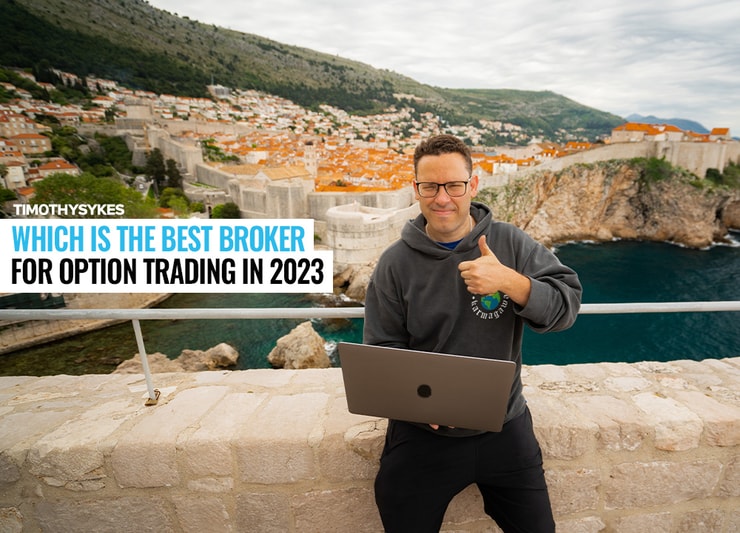Looking for the best broker for trading options in 2024? It hasn’t changed from last year — you still need a reliable options broker that suits your needs.
A good broker should help you achieve your trading goals. There’s really no “best” options trading broker for all traders. Your best fit depends on your trading strategy..
Whether you’re a beginner or an options trading veteran, there’s a broker for you. The first step is figuring out what you’re looking for. The following breakdown features the categories that are important for most traders..
Read on for five of my top picks for options brokers in 2024.
Table of Contents
- 1 How We Analyzed Our List of Options Trading Brokers
- 2 Our Top 5 Picks
- 2.1 1. Schwab’s thinkorswim — The Former TD Ameritrade Options Trading Platform
- 2.2 2. Power E-Trade — The Fast Executions Options Trading Platform
- 2.3 3. Interactive Brokers’ Trader Workstation — The Experts’ Options Trading Platform
- 2.4 4. Robinhood — The Beginners’ Options Trading Platform
- 2.5 5. Webull — The “Other” Commission-Free Options Trading Platform
- 3 What Brokers Allow Spread Option Trading?
- 4 Which Is the Cheapest Options Trading Brokerage?
- 5 Which Options Trading Platform Can Give Me Different Strategies for Securities?
- 6 Key Takeaways
How We Analyzed Our List of Options Trading Brokers

I did what you are doing right now — researching the different options brokers available. I made a list of all the options brokers that caught my attention, and you should too.
Prepare to take notes.
I looked for brokers that were reputable and had good reviews. They also had to offer a variety of options for trading.
Here’s a breakdown of my criteria for the best options trading brokers:
Fees and Commissions
I always look at the fees and options commissions associated with each broker. Fees can make the difference between a winning and losing trade.
For this guide, I compared fees for different types of trades. Then I looked for any hidden fees or charges that may have been snuck into the fine print.
Trading Platform
After analyzing the fees, I looked at each broker’s trading platform and tools. The platform should be user-friendly. It should also offer advanced features like real-time data, charting tools, and analysis.
I want a platform that doesn’t lag. In trading, seconds can be worth thousands.
I also checked for mobile trading options.
Customer Support
One important aspect that you shouldn’t overlook is customer support. This is important because you never know when you’ll need help. Or have a question that needs answering ASAP.
For this criteria, I looked for brokers that offered 24/7 customer service via phone, email, or chat.
Regulation and Security
I don’t trade with offshore brokers. Sure, it may be a good way to get around the PDT — but who cares if you don’t have any money to trade with?
It isn’t just about your broker following the rules. Good security ensures that your money is safe from other dangers too.
Our Top 5 Picks
My top 5 picks for best broker for options trading in 2024 are:
- Schwab’s thinkorswim — The Former TD Ameritrade Options Trading Platform
- Power E-Trade — The Fast Executions Options Trading Platform
- Interactive Brokers’ Trader Workstation — The Expert’s Options Trading Platform
- Robinhood — The Beginners’ Options Trading Platform
- Webull — The “Other” Commission-Free Options Trading Platform
Which options trading broker is the best one in 2024? Only you can answer that question because it depends on your needs and goals. However, I can point you in the right direction.
Here are five of my picks for the best options brokers to start your trading journey in 2024:
1. Schwab’s thinkorswim — The Former TD Ameritrade Options Trading Platform
My first options trading platform pick is thinkorswim.
It used to be exclusive to TD Ameritrade. But it came to Schwab in 2023, as TD Ameritrade merged into Schwab.
You get access to trade planners and a wide array of real-time data. You can even access thinkorswim mobile when you’re on the go.
Why We Like It
Thinkorswim is one of the best options trading platforms out there. It’s so good that it survived TD Ameritrade’s merger with Schwab, compelling Schwab to discontinue its StreetSmart Edge trading platform.
Schwab gives you access to a wide variety of educational tools. These tools can level up your trading.
Read my guide to trading options on Schwab here!
2. Power E-Trade — The Fast Executions Options Trading Platform
My second options trading platform pick is Power E-Trade.
E-Trade is another broker that I use frequently. It has two options trading platforms that cater to both beginners and veterans.
E-Trade Web is the basic platform on your browser that’s good for beginners. If you’re an experienced options trader, Power E-Trade is the platform you’ll find more useful.
Why We Like It
One of the great things about E-Trade is its 0.14-second trade execution. Fast executions is one of the biggest advantages in any style of trading.
When you’re trading options, you need to be as fast as possible — don’t forget, each contract is worth 100 shares! The low latency makes E-Trade a powerful tool for active traders.
Check out my guide to options trading on E-Trade!
3. Interactive Brokers’ Trader Workstation — The Experts’ Options Trading Platform
My third options trading platform pick is Interactive Brokers’ Trader Workstation.
Interactive Brokers (IBKR) is a solid choice for both beginner and advanced traders alike. This options broker is known for allowing traders to trade any stock or security.
Why We Like It
Traders of all experience levels can benefit from IBKR. But it’s geared toward advanced traders, who will make use of the power and customizability of its Trader Workstation desktop platform.
But you don’t have to be trading from some Manhattan high-rise. If you’re a trader who’s on the go a lot of the time, check out the IBKR Mobile app. This streamlined app is one way that IBKR is making itself accessible to traders after a better user experience.
Interactive Brokers also offers the Options Wizard. This tool helps you to pick the right security and build the options strategy that’s right for you.
If you find IBKR overwhelming, read my article on trading options on Interactive Brokers!
4. Robinhood — The Beginners’ Options Trading Platform
My fourth options trading platform pick is Robinhood.
For many traders, Robinhood was their gateway to options trading. Some professional traders still use Robinhood because it’s so simple to use.
This platform is geared toward newer traders — even “investors.” You won’t necessarily get the same kind of tools or research that you’ll find with other brokers. But you’ll find that it’s really easy to execute an options trade on their app.
Why We Like It
This broker offers a simple trading experience through their app. It also has basic educational content to get you started. Plus, you can use Robinhood on your desktop if that’s more your style.
What makes Robinhood great for many people is that it offers completely free options trading. I’m not just talking about no commission fees. Robinhood also leaves out the contact fees that most brokers charge.
In the years since its app debut, Robinhood has revolutionized the world of trading. That also means that much of what made it stand out from the rest has disappeared. It charges no commissions, requires no account minimum, and sells fractional shares. Now so do most other brokers.
Do you want to trade on Robinhood like a pro? Check out my essential guide to options trading on Robinhood!
Can’t trade options on Robinhood and don’t know why? I got you. Check out my article on why options trading might not be available on your Robinhood account.
5. Webull — The “Other” Commission-Free Options Trading Platform
My fifth options trading platform pick is Webull.
Webull is another one of those online brokers that’s great for starting traders. This options trading platform has a user-friendly interface. It makes it easy to plan and execute trades. Webull also offers a wide range of advanced tools for experienced traders.
Why We Like It
Like Robinhood, Webull is one of the few brokers with completely free options trading. This means that you don’t need to pay trading commissions or a per-contract fee. As always, read the fine print — regulatory fees and certain fee-carrying index options might complicate your trading plan.
Webull has a bit more power than Robinhood, making it an enticing pick.
Read my article on trading options on Webull here!
What Brokers Allow Spread Option Trading?

Most options trading platforms and brokers allow spread option trading. You can do this on TD Ameritrade/Schwab, E-Trade, Interactive Brokers, Robinhood, and Webull.
Spread option trading is a more advanced options trading strategy, so your broker may not immediately give you access to it.
For traders who qualify, spread trading can be a good way to limit downside risk while still leaving room for potential profits.
Spread option trading involves buying and selling options contracts on the same underlying asset, at different strike prices. You can also set different expiration dates.
Which Is the Cheapest Options Trading Brokerage?
Webull and Robinhood don’t charge their users any commissions or contract fees for options trading. This makes the two frontrunners for the cheapest options trading brokers.
Other brokers offer commission-free options trading. But, most of the time, you still need to pay contract fees and other trading costs.
Which Options Trading Platform Can Give Me Different Strategies for Securities?
While most options trading platforms can carry out most strategies, some will fit them better than others.
Let’s take a step back and look at what these platforms actually are: they’re products that exist to make money for their owners. They continue to be profitable if they serve their customers well.
A more advanced options trading platform like IB Trader Workstation caters to more advanced traders. These traders are more sophisticated than the average. It’s a safe bet that this platform will be able to carry out any strategy under the sun — and maybe even brainstorm a couple on its own.
Platforms that cater to newer traders, like Robinhood, don’t have that same pressure. While these platforms may be able to carry out more advanced options strategies, they’ll lack specialized tools like Trader Workstation’s Options Wizard.
It isn’t an advanced options strategy, but read what “buy to open” is in options trading before going any further.
Key Takeaways

The “best” broker for option trading in 2024 doesn’t exist. No one choice works for every trader. There are many great choices, and one could be the best for you.
Check out each broker to find platforms that fit your needs. Check out their charts, options tools, and execution times. You should also compare their commission fees and educational tools. With enough research, you’ll find one or a couple that suit you best.
Do you want to become a self-sufficient options trader? You have to dedicate time to studying and gaining trading experience.
I don’t trade options — I leave it to pros like tech entrepreneur and trader Ben Sturgill. His Spyder webinars are the product of more than 2 decades of experience in the market and a unique technology, and they’re well worth checking out.
Check out the webinar here to see why Ben’s smart-money scanner has been going haywire lately!



Leave a reply